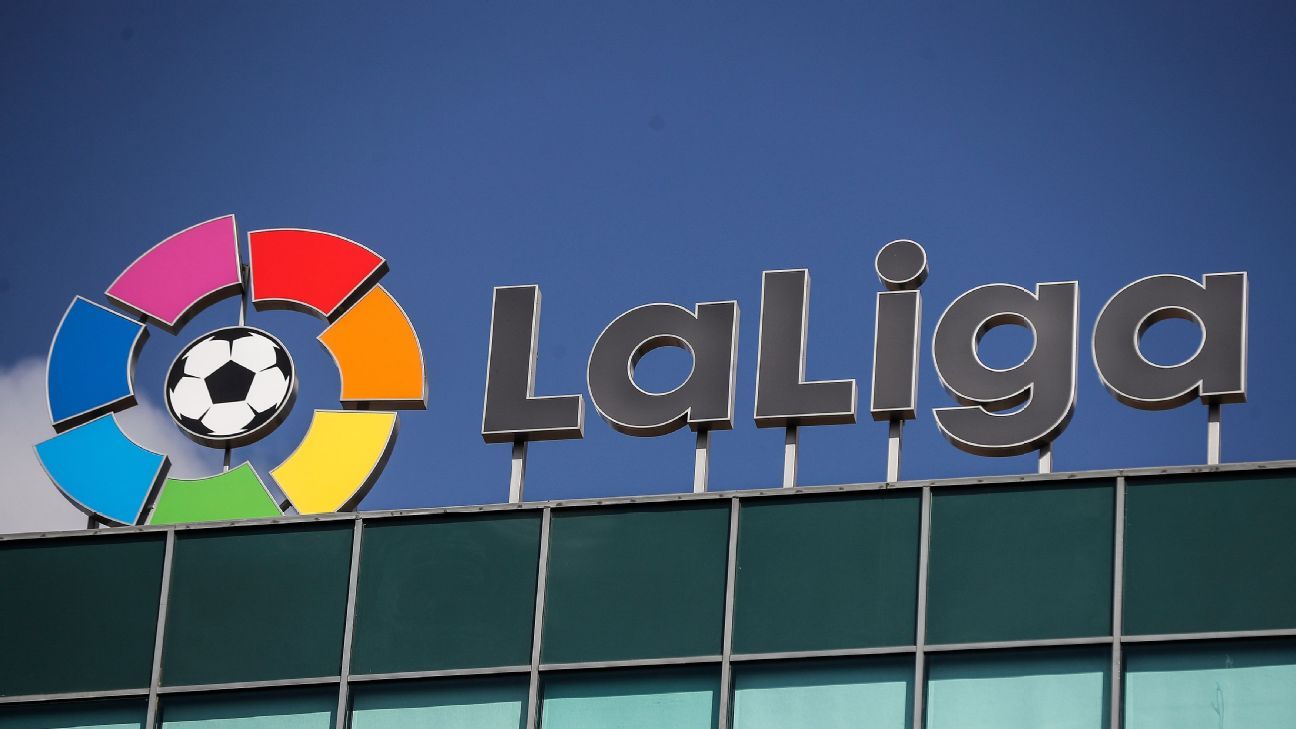
MADRID -- On the fifth floor of La Liga headquarters on Torrelavega Street, in the northeast part of the city, is a computer 4,232 times as powerful as the one this piece is being written on and quicker than Inaki Williams. The building, which towers over the road heading out of Madrid toward the airport, is virtually empty, but while it stands alone, the computer hasn't stopped working. Built to make sure you're not watching illegal streams of games you shouldn't be -- watching any game would be a fine thing right now -- the computer is now being used to help in the fight against the coronavirus.
There has not been a game in Spain since Eibar played Real Sociedad behind closed doors over a month ago, and no one knows when football is coming back. The sport has come up with plenty of initiatives during these days of confinement: There have been FIFA 20 tournaments and fundraising, online concerts and lots of silly stuff to pass the time. Some players are phoning their club's oldest members to check up on them; others are providing food. We've seen Leganes' daily workouts and Saul Niguez's plan to help small businesses get back to their feet.
- Stream new episodes of ESPN FC Monday-Friday on ESPN+
- Stream every episode of 30 for 30: Soccer Stories on ESPN+
Then there's La Liga's computer, heading into the monster's mouth. And, yes, that really is how it's referring to it: it is called Demogorgon.
"It's about the size of a normal computer, but it's capacity is more than 4,000 times the size. The processing speed is huge," says Emilio, the La Liga technician who oversees the computer. "It is built to detect and prevent piracy: We're searching for our content Monday to Sunday all over the world, and this is the tool that enables us to find it. Imagine how big it has to be to do that. Other systems, other computers, simply wouldn't be able to."
The computer in La Liga HQ can do that and more, so some of the league's processing capacity was plugged into the folding@home platform, a project in which people volunteer to run computer simulations typically focused on medical research, specifically around viruses and proteins. La Liga is essentially lending its capacity so, in a way, everything is run through them but at the same time nothing is. The machine is like the thousands of home computers involved in this effort, only it is so much more powerful -- and because it's La Liga, there is a relationship of sorts there. There are hundreds of thousands of normal computers; it is like 4,000 of them in one go. The processing speed is off the scale.
"We have engineers, IT experts, people who know the systems so well and they thought: 'Look, we can hand this over, we haven't got games every day -- Barcelona aren't on every day,'" Emilio says. "So, we 'loan' some of our 'space' for that research. We were helping investigations into cancer. But then when all this happened, attention shifted and we handed it over to fight against coronavirus."
Now that there are no games at all and no goals to pursue except recovery, even more processing speed can be harnessed to help the investigation -- along with more than 700,000 people across the globe who have joined the grid in the past month.
"La Liga contacted us and wanted to learn more about our work: The technical department of La Liga found folding@home and joined our grid, installing our client on their super computer in Madrid," says Gregory Bowman, associate professor in the Department of Biochemistry & Molecular Biophysics at the Washington University School of Medicine in St. Louis. That dramatically increases the chance of successfully modelling and understanding the coronavirus.
"In brief, we're trying to understand how all the moving parts of the SARS-CoV-2 virus' proteins contribute to their function, identify new therapeutic opportunities based on this insight, design new therapeutics and engage with experimental collaborators to test them," Bowman says.
The programme's models simulate the dynamics of COVID-19 proteins, searching for ways to attack the virus and identify points at which treatment can be most effectively inserted. It seeks to understand how the virus functions, watching the way that atoms might move. The simulations seek to understand the spike on the surface of the virus that identifies and attaches itself to human cells, watching and mapping how it might open up for its "attack": It is like the mouth of the Demogorgon monster from TV series "Stranger Things," or so analysts think. Hence the name.
The variables, though, are incalculable ... or they would be on a normal computer. Now, my laptop might produce the finest football articles known to man, but if it tried to simulate the virus' movement alone, I could be here a hundred years and not get anywhere near it. But with the combined power of processors worldwide, including super computers such as La Liga's, investigators are more optimistic.
"We're doing everything we can to accelerate the development of therapies," Bowman says. "We hope to start submitting papers soon, and we're keeping everyone up to date. Great progress is being made. We can't guarantee the outcome or timeline of our work, but we've already been successful on related problems like Ebola virus, and we're making progress on understanding how SARS-CoV-2 infects human cells and will soon share insight into novel therapeutic opportunities our simulations have uncovered, called cryptic pockets."
For now, work continues. And so, with a little help from La Liga, once more into the mouth of the monster.















 Phone: (800) 737. 6040
Phone: (800) 737. 6040 Fax: (800) 825 5558
Fax: (800) 825 5558 Website:
Website:  Email:
Email: 






